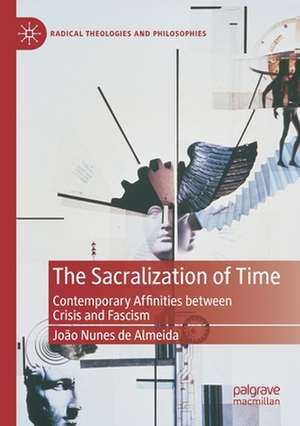The Sacralization of Time: Contemporary Affinities between Crisis and Fascism: Radical Theologies and Philosophies
Autor João Nunes de Almeidaen Limba Engleză Paperback – 9 iun 2021
| Toate formatele și edițiile | Preț | Express |
|---|---|---|
| Paperback (1) | 372.44 lei 6-8 săpt. | |
| Springer International Publishing – 9 iun 2021 | 372.44 lei 6-8 săpt. | |
| Hardback (1) | 377.72 lei 6-8 săpt. | |
| Springer International Publishing – 9 iun 2020 | 377.72 lei 6-8 săpt. |
Din seria Radical Theologies and Philosophies
-
 Preț: 372.98 lei
Preț: 372.98 lei -
 Preț: 368.67 lei
Preț: 368.67 lei - 15%
 Preț: 681.62 lei
Preț: 681.62 lei - 15%
 Preț: 630.15 lei
Preț: 630.15 lei -
 Preț: 377.13 lei
Preț: 377.13 lei -
 Preț: 379.96 lei
Preț: 379.96 lei -
 Preț: 378.08 lei
Preț: 378.08 lei - 15%
 Preț: 625.34 lei
Preț: 625.34 lei -
 Preț: 376.02 lei
Preț: 376.02 lei -
 Preț: 379.04 lei
Preț: 379.04 lei -
 Preț: 474.72 lei
Preț: 474.72 lei - 15%
 Preț: 633.86 lei
Preț: 633.86 lei - 15%
 Preț: 489.81 lei
Preț: 489.81 lei -
 Preț: 383.00 lei
Preț: 383.00 lei - 18%
 Preț: 1809.39 lei
Preț: 1809.39 lei - 15%
 Preț: 574.85 lei
Preț: 574.85 lei - 15%
 Preț: 516.69 lei
Preț: 516.69 lei -
 Preț: 374.51 lei
Preț: 374.51 lei - 15%
 Preț: 629.83 lei
Preț: 629.83 lei - 15%
 Preț: 564.90 lei
Preț: 564.90 lei - 18%
 Preț: 707.66 lei
Preț: 707.66 lei - 18%
 Preț: 706.43 lei
Preț: 706.43 lei - 15%
 Preț: 685.11 lei
Preț: 685.11 lei -
 Preț: 369.62 lei
Preț: 369.62 lei -
 Preț: 379.96 lei
Preț: 379.96 lei -
 Preț: 378.08 lei
Preț: 378.08 lei -
 Preț: 379.96 lei
Preț: 379.96 lei - 15%
 Preț: 624.71 lei
Preț: 624.71 lei
Preț: 372.44 lei
Nou
Puncte Express: 559
Preț estimativ în valută:
71.30€ • 74.22$ • 58.70£
71.30€ • 74.22$ • 58.70£
Carte tipărită la comandă
Livrare economică 31 ianuarie-14 februarie 25
Preluare comenzi: 021 569.72.76
Specificații
ISBN-13: 9783030465452
ISBN-10: 3030465454
Pagini: 159
Ilustrații: VIII, 159 p. 1 illus.
Dimensiuni: 148 x 210 mm
Greutate: 0.23 kg
Ediția:1st ed. 2020
Editura: Springer International Publishing
Colecția Palgrave Macmillan
Seria Radical Theologies and Philosophies
Locul publicării:Cham, Switzerland
ISBN-10: 3030465454
Pagini: 159
Ilustrații: VIII, 159 p. 1 illus.
Dimensiuni: 148 x 210 mm
Greutate: 0.23 kg
Ediția:1st ed. 2020
Editura: Springer International Publishing
Colecția Palgrave Macmillan
Seria Radical Theologies and Philosophies
Locul publicării:Cham, Switzerland
Cuprins
Introduction.- Chapter 1: Theology of Crisis.- Chapter 2: Politics of Crisis.- Chapter 3: Language of Crisis.- Chapter 4: Experience of Crisis.- Chapter 5: Refusal of Crisis.- Conclusion.
Notă biografică
João Nunes de Almeida studied at Lisbon University, Nova University of Lisbon and Lancaster University, UK. He was awarded his PhD in Sociology from Lancaster University, where he regularly teaches Criminology in the Law School.
Textul de pe ultima copertă
In this book, João Nunes de Almeida rethinks the relationship between crisis and fascism in today’s liberal democratic societies. Arguing that fascism has adapted to a post-modern idea of endless crisis, Almeida challenges one of the strongest liberal myths in western politics, namely that fascism and liberal democracy have different roots. Fascism, in Almeida’s view, is at the center of the very production of social relations in western capitalist societies, and is the result of the very desire to be saved from crisis underlying liberal democracy. It draws on stormy examples from Portugal’s contemporary history, with a particular focus on its fascist past and revolution, to explore affinities between crisis and fascism in other spatial and historical contexts. João Nunes de Almeida concludes that refusing to be saved from crisis becomes the refusal of any form of fascism in a more global context.
Caracteristici
Analyzes the relations between the crises in contemporary capitalism and the rise of fascism Draws on examples from Portugal's contemporary history Crosses research fields such as Critical Theory, Contemporary Continental Thought, Marxian Crisis Theory, Contemporary Modern History, Political Theology, and Foucauldian driven discourse analysis
